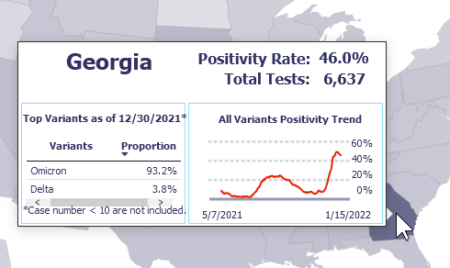mRNA sun protection, hormones vs prostate cancer, when mandates apply, and more
20 Jan 2022
Posted by Andrew Kantor
Vaccine mandates and you
The Supreme Court upheld the Biden administration’s CMS Covid vaccination requirement, which means health workers in Georgia now have until Feb. 14 to get their first (or only) COVID -19 vaccine dose, and March 15 to get the second dose.
Does that apply to pharmacies? Yep, if either participate in Medicare or Medicaid programs, or if you provide contracted services to an facility that does. NCPA has the details.
Note: CMS says a facility with more than 80 percent of staff vaccinated and a plan to achieve 100 percent staff vaccination rate within 60 days of Feb. 14 will not be subject to enforcement actions.
Just a few days to get your immunization certificate!
It’s this coming weekend! Get yourself an awesome (and awe-inspiring) APhA certificate to show your patients (and boss) that you’re at the top of the immunization game.
On Sunday, January 23, 2022, from 8:00 am – 5:00 pm, GPhA is offering “APhA’s Pharmacy-Based Immunization Delivery: A Certificate Program for Pharmacists” at our world headquarters in Sandy Springs.
Immunization training is hotter than ever (as you might imagine), so grab one of the few remaining slots: Get to GPhA.org/immunization-2021 fast!
For kids, fast tests, but not good tests
Between the quality of the tests and the (unknown) quality of the parents giving them, German biologists concluded that those quick antigen Covid tests are iffy at best when it comes to detecting the virus in kids.
How iffy? Overall, they found, “overall diagnostic sensitivity and specificity in paediatric populations” was just 64.2% for OTC antigen tests compared to 99.1% for the gold-standard PCR tests. Sure, 64.2% accuracy is fine for a third-string quarterback, but if you’re sending Junior to school (or kissing him goodnight) you want a bit more accuracy.
mRNA sunscreen
They call it a potential skin cancer vaccine, but “a shot to increase your protection against UV rays” is more accurate. Still, cool stuff.
They are researchers at Oregon State University College of Pharmacy, and they used mRNA technology to get mice’s skin cells to produce more antioxidant proteins. Those proteins can help clear out the damage done by sunlight exposure — sort of creating built-in sunscreen.
Following uptake of the mRNA into the cell and the cell’s machinery going to work, the cell should be at a high antioxidant level and able to take care of oxidative stress and DNA damage arising from ultraviolet radiation.
Hormones for prostate cancer
Hormone therapy can help treat prostate cancer patients. In fact, found Case Western Reserve University researchers, for men with intermediate- and high-risk prostate cancer (no matter their age), adding hormone therapy to radio therapy (no matter the dose) shows consistent improvement.
But what’s the best way to combine them? The hormones should be given with the radiation, not before radiation (as is done in some places), and it should continue until the radiotherapy is done — months, typically.
Computer predicts Covid survival
When you have a lot of people in the ICU with Covid-19, you know a bunch will live and a bunch will die. Now British and German researchers have shown that a computer can determine who is most likely to survive — weeks in advance.
The machine learning system uses a patient’s plasma proteome from a blood sample. Considering the levels and measurement time of 321 proteins, it’s able to calculate who’s likely to be discharged out the front door, and who won’t.
Walgreens launches Covid tracker
Following on its annual flu tracker, Walgreens has launched its first pandemic tracker — one that lets you see how Covid-19 and its variants are spreading. It’s based on data from the PCR tests taken in its stores, and is (they say) updated “in near real-time” with variant information.

Medicare and affordability
A new report using HHS data found that more than 5 million Medicare beneficiaries — 3.5 million who are 65 and over, plus 1.8 million under 65 — “struggle to afford prescription medications.”
And those under 65 with Medicare — who are typically disabled (or with end-stage renal disease)? It’s even worse for them.
Latest coffee news: good for guts
A new review paper published in the journal Nutrients says that three to five cups of coffee a day …
- Aids digestion
- Isn’t harmful to the digestive tract
- May reduce the risk of gallstones and pancreatitis
- Protects against liver diseases, including liver cancer
- May protect against constipation
Oh and by the way, it was funded by the coffee industry’s “Institute for Scientific Information on Coffee.”

Your grain of salt
A moment of silence
…for the 2,000 hamsters in Hong Kong who had to be killed because they were suspected of carrying Covid-19. (And the 150 customers forced into quarantine.)


